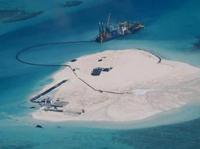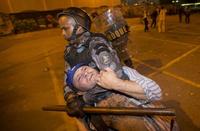-
China creates artificial lands in disputed waters to boost sovereignty claims

The Chinese government has been implementing a policy of creating new islands on the reefs and shoals of the South China Sea in order to further Chinese territorial claims to the area and increase sea-based infrastructure. By moving sand and other building materials onto these very shallow reefs, such as the Spratly archipelago, new islands are formed which officials say will eventually support buildings, humans, and surveillance equipment. According to the United Nations Convention on the Law of the Sea, by creating the lands, China will have economic rights within a 200 mile zone of each location.
-
-
Obama orders 300 U.S. military advisers to Iraq (updated)
President Barack Obama yesterday announced he had authorized sending up to 300 U.S. troops to Iraq to help the Iraqi military cope with a rapidly advancing attack by Islamist fighters from the fundamentalist group ISIS. “It is in our national security interest not to see an all-out civil war in Iraq,” Obama said. While reiterating that he would not send combat troops to Iraq, the president said the United States would help the Iraqis “take the fight” to the militants, who he said pose a threat to Iraq’s stability and to American interests.
-
-
Maliki says he will not step down to facilitate U.S. air strikes against ISIS
A spokesman for the Iraqi prime minister, Nouri al-Maliki, has said Maliki will not stand down in order to make it politically easier for the United States to launch air strikes against ISIS Sunni militants who have made rapid advances across Iraq, culminating yesterday (Wednesday) with taking control over Iraq’s largest oil refinery, located in Baiji, 130 miles north of Baghdad. The Islamists now control a third of Iraq’s territory. Many U.S. lawmakers, and many analysts of Iraq, consider the failed leadership Maliki — a Shi’a politician who, at Iran’s urging, has pursued a narrow sectarian policies which has alienated Iraq’s Sunnis and Kurds — as the reason for the willingness of the Sunni population in Iraq to welcome ISIS as a protector of Sunni interests, and the indifference shown so far by the Kurds in the face of ISIS gains.
-
-
If Nouri al-Maliki stays in office, Iraq faces destructive descent into a long civil war
Throughout his two previous terms, Nouri al-Maliki managed to create various problems but failed to solve any of them. Instead of winning over the population of the heavily Sunni provinces, and through them Iraq’s wider Sunni community, al-Maliki’s Shiite-dominated government persistently alienated and discriminated against them. Before long, Sunni areas started to see protests, sit-ins and demonstrations against the policies of al-Maliki and his government. The prime minister’s response was to increase the presence of security and military forces, which were mainly staffed and headed by Shiite personnel. Thanks to his unwillingness to concede to the demands of the Sunni-majority provinces, instead resorting to the use of force, his struggle against the leaders of these provinces (and indeed most opposition Sunni leaders) reached the point of no return. Al-Maliki’s departure, and the formation of a government of national unity of technocrats that could put an end to corruption and at least restore basic services, could perhaps offer a chance for some stability. It would also help end the many disputes and problems al-Maliki has created with the Kurdish regional government, the Sunni provinces, and especially with his own Shiite coalition partners. His insistence on remaining in office will only hasten the start of a destructive and prolonged civil conflict — all too reminiscent of the catastrophe still unfolding across his country’s north-eastern border.
-
-
How has Iraq lost a third of its territory to ISIS in three days?

The Islamic State of Iraq and the Levant (ISIL), also known as ISIS, has about 12,000 fighters in its ranks. About 8,000 needed only forty-eight hours to take Mosul, Iraq’s second largest city, although it was defended by more than 27,000 government troops. It took ISIL another twenty-four hours to gain control of about one-third of Iraq – facing little, if any, resistance from Iraq’s one-million-strong security apparatus. The reasons: After the U.S. occupation force, in 2003, dismantled Iraq’s professional military, a new Iraqi army was re-established from militia members and low-ranking members of the Ba’ath army. Senior officers in Saddam Hussein’s forces were dismissed, which gave rise to at least two security issues. Firstly, military officers of the previous army were steered toward terrorist groups. Secondly, Iraq’s new military suffered from the loss of expertise and military discipline instilled by their former officers. In addition, poor governance has led to widespread corruption in both political and military spheres. Military personnel are routinely reported to be soliciting bribes, especially in Sunni areas of Iraq.
-
-
U.S. begins evacuation of Baghdad embassy; Iranian general coordinating the defense of Baghdad
The State Department yesterday (Sunday) that non-essential employees at the U.S. embassy in Baghdad were being evacuated, but that the United States would remain “fully equipped to carry out its national security mission.” The Pentagon has ordered an aircraft carrier and two missile-carrying ships to the Persian Gulf, hinting at the possibility of imminent U.S. air strikes against the advancing Sunni insurgents. The Sunni insurgents who now control about a third of Iraq said Sunday that they had executed 1,700 Iraqi soldiers, stressing that all those who killed were Shi’as. Iran had sent 2,000 advance troops to Baghdad, and General Qassem Suleimani, the commander of the Qods Force of Iran’s Revolutionary Guard, is coordinating the defense of Baghdad.
-
-
World Cup security teams focus more on crime, protests – less on terrorism

During the 2014 FIFA World Cup, currently being held across twelve different venues across Brazil, security teams have extensively prepared for measures to be taken against crime and protest related to heated political unrest. American bomb-busting robots, Israeli surveillance drones, and German anti-aircraft tanks — an international assortment of security officials and measures – are just some of the pieces of the greater security apparatus protecting both players and fans.
-
-
Could devastating floods help Bosnians heal their war wounds?
The violent breakup of Yugoslavia in the 1990s and the subsequent war in Bosnia between 1992 and 1995 took the lives of more than 100,000 Bosnians and left two million homeless. Two decades later those survivors have been forced once again to abandon their homes — this time by floodwaters rather than bullets. The heaviest rainfalls ever recorded in the Balkans have led to catastrophic flooding in Bosnia and Herzegovina. Swelled by weeks of rain, the devastating floodwaters swamped more than 60 percent of the country last month, destroying more than 100,000 homes and displacing around 950,000 citizens. The floods also damaged vital infrastructure, destroyed industrial assets, and killed livestock. It is difficult to find a ray of light in this grim story of disaster, except this: Over the past weeks, media outlets have been flooded with stories and images of bravery, camaraderie, and community spirit where ethnicity suddenly became irrelevant. It remains to be seen how this feeling of camaraderie and community can be harvested to mobilize the people of Bosnia ahead of the general elections in October. Such a movement would have the potential to force corrupted political elites into the corner by draining them of their political capital.
-
-
Egypt: The Gaullist option (update)

On Sunday, Abdel Fattah el-Sisi was sworn in as Egypt’s president. On 3 July 2013, Sissi, then the commander of the Egyptian army, ousted President Mohammed Morsi, the leader of the Muslim Brotherhood. Egypt’s experience with former generals as heads of state is not reassuring. Sissi’s predecessors — Gamal Abdel Nasser (1956-70), Anwar Sadat (1970-81), and Hosni Mubarak (1981-2011) – did little to modernize Egypt and make it economically self-sufficient and politically stable. In 1958, when General Charles de Gaulle was called back to lead France, he conditioned his return on deep structural reforms, reforms which replaced the inherently ungovernable Fourth Republic with the stable and effective Fifth Republic. The United States should encourage President Sisi to consider de Gaulle’s example and use his authority and broad powers in ways that Nasser, Sadat, and Mubarak did not – to modernize Egypt and put it on a path leading to economic prosperity, political stability, and social cohesion.
-
-
With massive presence of foreign fighters, Syrian conflict resembles 1980s Afghanistan war
A new report by the Soufan Groupestimates that in just three years, 12,000 foreign fighters have traveled to Syria to support various rebel groups fighting the government of President Bashar al-Assad. U.S. and Israeli intelligence previously estimated that there were 7,000 foreign fighters in Syria at the start of 2014. Security experts are comparing the situation to the influx of foreign fighters into 1980s Soviet-occupied Afghanistan, which saw 10,000 foreign fighters battle the Soviets in the decade-long conflict that spawned al-Qaeda.
-
-
Canada donates Biosafety Level 3 modular laboratory to Caribbean health authorities
The Biological Security program of Canada’s Global Partnership Program(GPP) has officially transferred a new biological containment laboratory to the Caribbean Public Health Agency(CARPHA). The Biosafety Level 3 (BSL-3) modular laboratory facility, a first in the Caribbean and located in Port of Spain, Trinidad and Tobago, improves diagnostic capabilities for human and veterinary pathogens with high epidemic potential.
-
-
Court dismisses case against U.S. charities supporting West Bank settlers
U.S. District Judge Jesse Furman has ruled that plaintiffs describing themselves as residents of “Occupied Palestine” cannot proceed with claims that five U.S.-based organizations have funded attacks against Palestinians. The thirteen men and women — two Americans, ten Palestinians, and one Greek — argued that a portion of the territory where they reside is “within the internationally recognized borders of the future Palestinian state.”Furman deemed the allegation “entirely conclusory.”
-
-
U.S. officials say Israel softening position on nuclear deal with Iran
Israel’s official position on any agreement reached between the world powers and Iran over Iran’s nuclear program is “zero, zero, zero,” that is, Israel insists that the agreement should clearly stipulate that Iran should have no centrifuges to enrich uranium, no centrifuge production capability, and no heavy-water reactor and the means to extract weapon-grade plutonium from it. American officials say, however, that informally there has been a softening of Israel’s position, and that it now appears clear that Israel no longer regards the zero- zero, zero option as realistic and achievable.
-
-
Access of Russian surveillance craft to U.S. airspace questioned
Under the Treaty on Open Skies (OS), signed in 1992 and ratified in 2002, thirty-four nations allow the protected passage over their territory of surveillance aircraft from other OS signatory member states, aircraft featuring advanced sensory equipment that allow for the monitoring of arms controls compliance and troop movements. With rising U.S.-Russia tensions over Ukraine, and with information emerging about a new Russian surveillance aircraft model equipped with the most advanced surveillance capabilities, U.S. government officials and lawmakers question whether OS-related Russian surveillance flights over the United States should continue.
-
-
Al Qaeda's chief bomb maker killed in U.S.-backed attack in Yemen

Ibrahim al-Asiri, 32, al-Qaeda’s chief bomb-maker, is said to have been killed in a U.S.-supported, 2-day attack on al-Qaeda operation base in south Yemen on Sunday and Monday. The attack on the base included ground attacks by Yemeni special forces ferried to the theater in Russian-made helicopters piloted by U.S. Special Forces pilots, and drone strikes. Yemeni special forces, using intelligence provided by the United States, set up an ambush for al-Asiri and opened fire on a 4x4 vehicle believed to be carrying him. Samples were taken from the body believed to be that of al-Asiri, and DNA tests are now being conducted.
-
- All
- Regional
- Water
- Biometrics
- Borders/Immig
- Business
- Cybersecurity
- Detection
- Disasters
- Government
- Infrastructure
- International
- Public health
- Public Safety
- Communication interoperabillity
- Emergency services
- Emergency medical services
- Fire
- First response
- IEDs
- Law Enforcement
- Law Enforcement Technology
- Military technology
- Nonlethal weapons
- Nuclear weapons
- Personal protection equipment
- Police
- Notification /alert systems
- Situational awareness
- Weapons systems
- Sci-Tech
- Sector Reports
- Surveillance
- Transportation
Advertising & Marketing: advertise@newswirepubs.com
Editorial: editor@newswirepubs.com
General: info@newswirepubs.com
2010-2011 © News Wire Publications, LLC News Wire Publications, LLC
220 Old Country Road | Suite 200 | Mineola | New York | 11501
Permissions and Policies
Editorial: editor@newswirepubs.com
General: info@newswirepubs.com
2010-2011 © News Wire Publications, LLC News Wire Publications, LLC
220 Old Country Road | Suite 200 | Mineola | New York | 11501
Permissions and Policies
